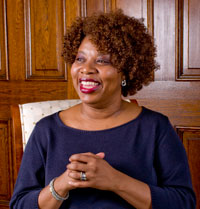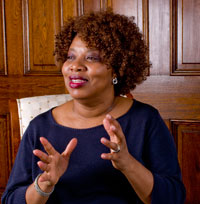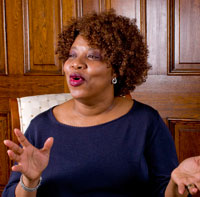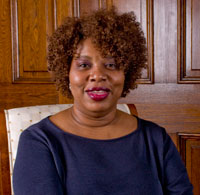A Conversation with Maggie Williams ’77
A Conversation with Maggie Williams ’77
by Jason H. Pier ’08
Trinity: In your inspiring Commencement address to the 2009 graduates, you told them to work continuously toward achieving their dreams, even amidst other demands in their lives. Do you remember what you aspired to be when you graduated from Trinity?

Maggie Williams ’77
Maggie Williams: It wasn’t so much about what I wanted to be as much as it was about what I wanted to do. I had been involved in student government in high school. That experience was exhilarating. I had to get totally outside of self and think about what other people wanted or needed – even if I was just working on things like school fundraisers, a school dance or freshman orientation week.
Thinking about how to serve multiple interests and arrive at some form of “good common” was a complex but fascinating puzzle. Working on this kind of puzzle drew me into political life, I think.
I like the challenge and the personal reward of designing solutions to problems.
Obviously, figuring out that puzzle becomes more consequential when you understand that people’s lives, hopes and dreams hang in the balance.
T: How did your liberal arts education at Trinity help you throughout your career?
 MW: I believe in a liberal arts education because the world needs, and has always needed, multidimensional thinkers. What Trinity did for me is what I imagine multiple lenses do for photographers – it helped me see the world from different perspectives. Studying a variety of subjects gave me an opportunity to keep shifting my vantage point. You look at the world through the lens of history or sociology or philosophy. It changes you. It challenges you to gain a healthy respect for other people’s points of view.
MW: I believe in a liberal arts education because the world needs, and has always needed, multidimensional thinkers. What Trinity did for me is what I imagine multiple lenses do for photographers – it helped me see the world from different perspectives. Studying a variety of subjects gave me an opportunity to keep shifting my vantage point. You look at the world through the lens of history or sociology or philosophy. It changes you. It challenges you to gain a healthy respect for other people’s points of view.
T: You have had a continuously-rising career path from being aide to Arizona Congressman Morris Udall to a partner in Griffin Williams Critical Point Management, LLC. Was this a plan you had in your mind and went after, or was it more fate?
MW: Whenever people talk about me having a career, it always makes me chuckle a little. I did not think of myself as a person with a clear path. I never planned much of what happened to me. I knew the kind of things I was interested in doing and I kept listening and looking, following interesting things to do and getting involved with people I thought were interesting.
People gave me advice, and for the most part I took advice that felt right for me. I wasn’t much afraid to try anything. I don’t think my fearlessness was bravery. It was more the fearlessness of being young. I had opportunities and I just made choices – a lot of good ones and a lot of bad ones. My secret weapon: my mother kept me in her prayers.
T: What is your secret for balancing your career with your personal life?
 MW: A lot of people struggle with the question of balance their entire lives. Like most, I just try hard to make my life work for me and those I love. I fail miserably half the time … and the other half I spend apologizing for my failures.
MW: A lot of people struggle with the question of balance their entire lives. Like most, I just try hard to make my life work for me and those I love. I fail miserably half the time … and the other half I spend apologizing for my failures.
I don’t think the balance question is as simple as choosing between your work and your personal life. It is trying to figure out how to have a “whole” life, an integrated life – learning to live so you do things which feed your mind, body and spirit. It is also about putting your worry about balance in perspective. I think most of the people in the world have much harder lives than I do.
T: How has technology changed communications in recent years?

MW: I think technology has facilitated a shift in communications, not only in politics but also in our culture from a “one to many” model to a “many to many” communications model. Everybody gets to help set the agenda for what gets our attention. Everyone can join a conversation. Everyone can participate. We are living through a cultural norm shift. I think this new communications culture aligns itself pretty well with our country’s democratic values – it’s messy but it works.
T: How did you come to know Secretary of State Clinton?
MW: I met Hillary at the Children’s Defense Fund (CDF). By the time I arrived at CDF to an advertising project in the 1980s, Hillary was chair of the CDF board of directors. Hillary had a long history at CDF working on children and family issues with the organization’s founder and president, Marian Wright Edelman. Hillary was funny, smart, interesting, hardworking and kind. It was pretty easy to form a friendship with someone who has those qualities.